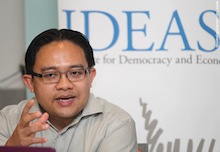Are we really free to talk?

Although extremists must be countered, something inside many moderates may be saying we should restrain ourselves.
Wan Saiful Wan Jan, The Star
THE tradition of political foundations is something that we are not very familiar with in Malaysia. But in quite a few countries around the world, usually those that are more developed and more democratic, political foundations are a norm.
Generally speaking, a political foundation is a not-for-profit organisation that is set up for a political purpose. This could be promoting a certain set of values, building the capacity of political parties through training programmes, upskilling civil society organisations and community activists, and more.
The “political” nature of their work makes them different from most other non-profits that normally avoid being political.
These political foundations operate differently from one country to another. In the United States, for example, the names of the International Republican Institute and the National Democratic Institute may create the impression that they work for the Republican and Democratic Parties respectively.
In reality, their relationship with the political parties is not as direct as many would imagine.
In Germany, politician foundations are directly linked to a particular political party and funded by taxpayers based on the amount of votes received by their parties. To simplify, the German political foundations exist to promote the values and principles of the parties that they are linked to.
The Friedrich Naumann Foundation for Freedom (FNF) has been one of the Institute for Democracy and Economic Affairs’ (IDEAS) main funders since before we were launched in 2010. They are closely linked to Germany’s Free Democratic Party and label themselves as the foundation for liberal politics.
In mid-October, the FNF organised an important regional event called the “Freedom Week”. Together with other FNF partners in Thailand, Myanmar, Cambodia, Indonesia, the Philippines and South Korea, IDEAS took part in this one-week campaign for freedom in the region.
Among others, a short film competition was held in Thailand, an expert meeting on religious freedom was held in Indonesia, a discussion on the experiences of Korea and Germany in conflict and reconciliation was held in South Korea, a group cycling to rural high schools was held in Cambodia to campaign for freedom to get education, and thousands of people took part in an anti-corruption freedom run in Manila.
For our part, my colleague Tricia Yeoh and I held an online “Freedom Conversation” via Twitter. That was a completely new experience for me and I greatly enjoyed it.
We invited questions from those who follow our @IDEASMalaysia Twitter account. Over the course of one hour, people could ask us anything that they wanted without any restrictions. We certainly got what we bargained for.
The questions thrown at us covered many topics. They ranged from the extremism of some right-wing, non-governmental organisations to the sudden about-turn by the so-called “progressive” Umno leaders on the Sedition Act, the limits of freedom and liberty, authoritarianism in PAS, redelineation of electoral boundaries, and even the role of the monarchy as well as what I, as a liberal, thought of the royalty.
The thing that struck me most about all these questions was how restrained people were. The only ones who tried to be provocative were close friends who were playfully teasing me with their questions. However, no one asked any difficult or hard-hitting questions.
When I say that “people” were restrained during the session, I actually include myself too. Looking back at the list of questions and my answers, it was obvious that even I was very cautious with my answers, making sure they were “safe”.
For example, one of the questions I had to answer was whether religion has played a negative role vis a vis freedom in Malaysia.
My answer was: “If I answer you honestly, tomorrow I will be arrested. So my politically correct answer is we have seen some good uses and some awful abuses of religion in Malaysia.”
When I was typing the answer, I probably had only a few seconds to think about it because the online conversation was happening quite fast. But looking back, I realise that my impromptu answer was actually quite telling.
With the benefit of hindsight, and if I reflect honestly on the Freedom Conversation session, I must admit that there was an element of self-censorship at play throughout that one hour.
As much as I wanted to speak up, subconsciously I was stopping myself from being totally frank.
Personally, I find that rather troubling. Especially so because at the same time, I also feel that we cannot afford to do otherwise in this current environment. Isn’t that a shame?
I wonder how many people out there share my predicament. You know that there is a dire need to speak up. You know that there are so many clowns out there spewing hatred. And you know that for the sake of our country, these extremists must be countered.
Despite all that, something inside says that you should restrain yourself. While the extremists are safely protected, you feel vulnerable despite being on the right, liberal and moderate side.
Our Rukun Negara says that we as a country are committed to “guaranteeing a liberal approach towards her rich and varied cultural traditions”.
As we come to the close of 2014, I cannot help but wonder if the liberal spirit of the Rukun Negara actually means anything anymore.

